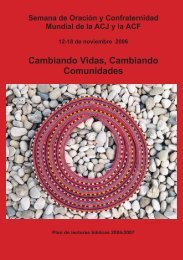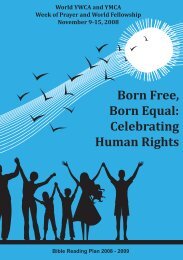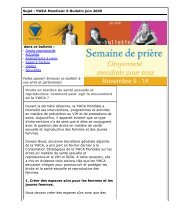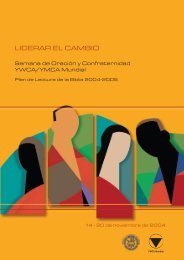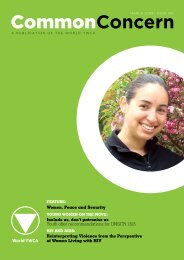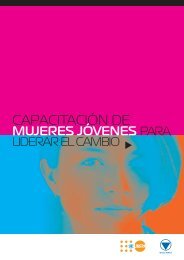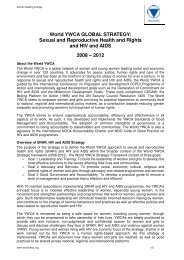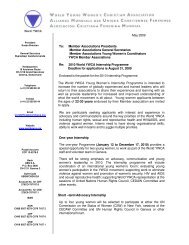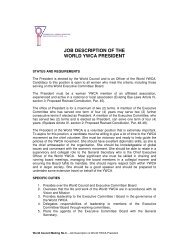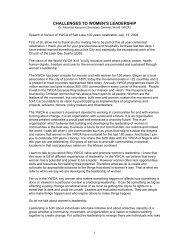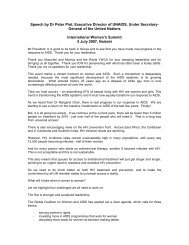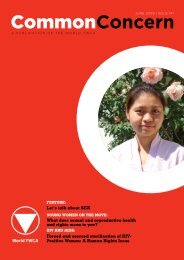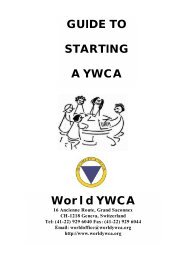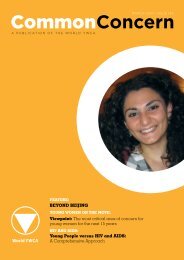If I kept it to myself - World YWCA
If I kept it to myself - World YWCA
If I kept it to myself - World YWCA
You also want an ePaper? Increase the reach of your titles
YUMPU automatically turns print PDFs into web optimized ePapers that Google loves.
<strong>If</strong> I <strong>kept</strong> <strong>it</strong> <strong>to</strong> <strong>myself</strong><br />
Promise Mthembu<br />
Many young people shy away from being tested and<br />
from talking openly about HIV infection; thus we have a<br />
silent, underground epidemic. These young people are in<br />
school, in tertiary inst<strong>it</strong>utions, and in the productive and<br />
reproductive years of their lives.<br />
My name is Promise Mthembu, a 31-year-old<br />
South African women living w<strong>it</strong>h HIV. I learnt<br />
about my HIV status in 1995 when I went for<br />
my tuberculosis (TB) check up. I was 20 years<br />
old at the time. I think I was infected when I was<br />
15 years old as my child, who is now 14, is also<br />
living w<strong>it</strong>h HIV. Doc<strong>to</strong>rs speculate that she was<br />
infected at birth. When I received the result of my<br />
test, I was shocked and angry. I had been part of<br />
an HIV and AIDS project while in school, I knew<br />
about HIV, but I did not think <strong>it</strong> could happen <strong>to</strong><br />
me. I had only one sexual partner and was from<br />
a religious family.<br />
Anger led me <strong>to</strong> start attending HIV and AIDS<br />
meetings. I wanted <strong>to</strong> change the way HIV and<br />
AIDS work was done. The campaigns at the time<br />
were not working; after all, if they were, I would<br />
not have been infected.<br />
Five months after receiving the devastating<br />
news of my HIV status, I began <strong>to</strong> talk openly<br />
about living w<strong>it</strong>h HIV. In an effort <strong>to</strong> challenge the<br />
approach of organisations working in the field,<br />
I decided <strong>to</strong> actively participate in those areas<br />
I found lacking. I began w<strong>it</strong>h the Department<br />
of Health Regional Office offering one on one<br />
counselling and handling wr<strong>it</strong>ten requests on HIV<br />
and AIDS education. Later, I volunteered for the<br />
Prince Mshiyeni Hosp<strong>it</strong>al as a counsellor and<br />
educa<strong>to</strong>r. During my time there, I established a<br />
support group, the first of many I was <strong>to</strong> in<strong>it</strong>iate in<br />
the coming years.<br />
Between September 1996 and April 1997,<br />
I acted as the Durban regional coordina<strong>to</strong>r<br />
for the National Association of People Living<br />
w<strong>it</strong>h HIV and AIDS (NAPWA). W<strong>it</strong>h NAPWA, I<br />
coordinated support groups in the Durban region,<br />
88<br />
giving lectures and presentations. I also carried<br />
out office administration as required. During<br />
my tenure w<strong>it</strong>h NAPWA, The National AIDS<br />
Convention of South Africa KwaZulu Natal offered<br />
me a full-time pos<strong>it</strong>ion as a regional advocacy<br />
task team coordina<strong>to</strong>r. It was in this pos<strong>it</strong>ion, as<br />
I organised advocacy team meetings and gave<br />
presentations <strong>to</strong> provincial parliament, that I<br />
established <strong>myself</strong> as an activist.<br />
In 1998, the South African Youth Commission<br />
offered me a pos<strong>it</strong>ion as a project coordina<strong>to</strong>r for<br />
Pos<strong>it</strong>ive Ambassadors. Although there has been<br />
plenty of HIV and AIDS education in South Africa,<br />
<strong>it</strong> had not managed <strong>to</strong> change the behaviour<br />
of young people. The South African Youth<br />
Commission identified <strong>it</strong>s role in the campaign<br />
against the AIDS epidemic, and decided that<br />
<strong>it</strong> would adopt the Commonwealth Youth<br />
Programme’s concept of Young Pos<strong>it</strong>ive Living<br />
Ambassadors. YPLA is aimed at young people<br />
between the ages of 14 and 35.<br />
It had become evident that many programmes<br />
aimed at young people were not owned or driven<br />
by young people. In response <strong>to</strong> this gap, young<br />
people living w<strong>it</strong>h HIV drove the YPLA project. Its<br />
focus is behavioural change and pos<strong>it</strong>ive living;<br />
working not only w<strong>it</strong>h HIV infected youth, but also<br />
w<strong>it</strong>h untested youth, vulnerable youth, and HIV<br />
negative youth as well.<br />
HIV infections among women younger than<br />
20 years of age have been increasing in the<br />
KwaZulu Natal region. Young people who have<br />
tested HIV pos<strong>it</strong>ive face huge discrimination in<br />
many sec<strong>to</strong>rs of society. Many young people<br />
shy away from being tested and from talking<br />
openly about HIV infection; thus we have a silent,



